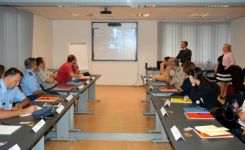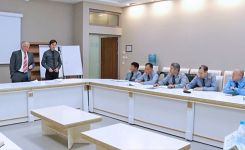- Partnership for Peace Consortium of Defense Aca...
- Kazakhstan Leading the Way in Defense Education
Kazakhstan Leading the Way in Defense Education
GARMISCH-PARTENKIRCHEN, Germany (Jan 27, 2015) – If you walk the halls of Kazakhstan’s National Defense University (NDU) you will see a defense education institution amidst a remarkable transformation. The transformation is through the Defense Education Enhancement Program (DEEP), a close collaboration among Kazakhstan, NATO, and the Partnership for Peace Consortium (PfPC).
Defense education is an important element of NATO’s Individual Partnership Action Plan (IPAP) for Kazakhstan. As such, NATO and the Partnership for Peace Consortium (PfPC) enjoy close collaboration with Kazakhstan, resulting in the successful implementation of defense education programs in Kazakhstan.
The DEEP program in Kazakhstan has seen two recent, notable successes: 1) The development of a new course on Western Operational Art, which is scheduled to be taught at the NDU for the first time starting this summer, 2) The introduction at Kazakhstan’s Partnership Training and Education Center (KAZCENT) of UN Staff Operations and Legal Aspects of Peace Support Operations courses, both of which are being taught for the first time this year.
Kazakhstan’s defense education efforts foster interoperability between the armed forces of Kazakhstan and her international partners, and are an important part of preparing Kazakhstan’s forces to participate in UN peacekeeping operations. Along these lines, DEEP is now working with KAZCENT on the development of a Protection of Civilians course.
The DEEP program was initiated in 2007 in response to efforts of former Soviet Union states to transform their defense institutions. Kazakhstan was the first country to begin collaborating with the DEEP program and it is fitting that today Kazakhstan is not only a recipient of DEEP program benefits, but is also a contributor. Kazakhstani defense education experts are now part of DEEP teams providing assistance to partner countries. As the PfPC and NATO look to the future of DEEP, they envision a converging of norms. In the words of James Appathurai, NATO’s Deputy Assistant Secretary General for Political Affairs and Security Policy, “Our readiness to tackle new and diverse threats and challenges in the future will only be as strong as our commitment today to building like-minded doctrinal standards among our educational commands. These common threads will enable us to continue to stand by one another in partnership and cooperation.”



